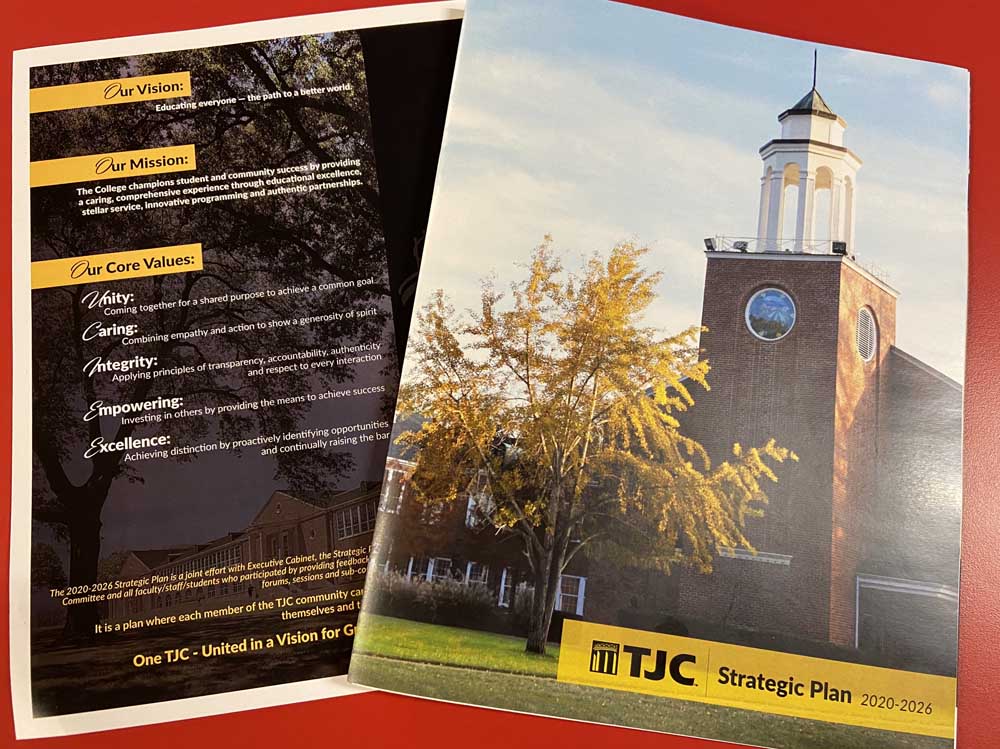TJC unveils strategic plan to take college into its next century of service
Published 2:04 pm Thursday, January 30, 2020

- TJC Strategic Plan
Tyler Junior College is making plans now to prepare the school to enter a second century of serving East Texas.
The TJC Board of Trustees voted to approve a new strategic plan for 2020 through 2026, when the college will mark its 100th anniversary.
Trending
Kim Lessner, vice president for marketing and enrollment services and chief communications officer, presented the plan to the board during its January meeting on Thursday. She said the steering committee was made up of a diverse group of stakeholders.
“We had executive leadership involved but really we wanted to ensure this plan included the voice of our faculty, staff, students and even community members,” she said.
The plan includes new vision and mission statements for the college.
Lessner said the new vision statement, “Educating everyone — the path to a better world,” and mission statement are about placing equal emphasis on student and community success.
The mission statement is “The College champions student and community success by providing a caring, comprehensive experience through educational excellence, stellar service, innovative programming and authentic partnerships.”
“We took a lot of time thinking through the core values because this is really a reflection of the beliefs of TJC,” Lessner said. “Who we are, but also how we choose to work.”
Trending
The values the college hopes to embody are unity, caring, integrity, empowering and excellence.
Once selected, those values helped drive the college’s priorities, which helped form the mission statement, ahead of its centennial.
Lessner said the committee chose to select a handful of priorities, which encompass areas where they can work together to drive the college forward.
In the realm of educational excellence, the college will work to enhance student success, enrich curriculum, attract a high-performing and diverse faculty, and ensure the faculty has the tools and resources they need.
Some plans of action will include focusing efforts to identify and eliminate the top five learning and educational barriers, work with students to build career and financial literacy, expand co-curricular learning opportunities, conduct interviews with faculty to learn why they stay and compare that to exit interviews, and create a dedicated center for faculty resources and training.
Lessner said making stellar service a priority isn’t just about students — it extends to faculty and community as well.
“Our customers are not just students, they’re each other,” she said.
The college will work to optimize core values, remove barriers that impede access to service, maintain and optimize its technology infrastructure, and foster a culture of transparency.
Some steps they’ll take to ensure this priority include defining a model of service that provides clear guidelines on how to put the college’s values into action, using data to better understand and meet the needs and expectations of customers, enhanced technology training, and developing an internal communication process that emphasizes collaborative awareness, partnerships and transparency.
Lessner said the plan also is about being a good neighbor.
When it comes to innovative programming the college hopes to foster learning through mentoring, optimize learning spaces, create better prepared students and utilize extracurricular institutional resources to enhance student engagement, which in return will increase persistence and graduation rates.
TJC hopes to further those goals by developing mentoring pathways for both students and faculty, creating a centralized repository of learning space resources, developing a facilities and online strategy through 2030, improve on-boarding for students, and create more extracurricular opportunities.
The last area of focus in the plan revolves around creating authentic partnerships. TJC hopes to promote relationships with secondary and postsecondary educational institutions, build strong partnerships with businesses and create workplace opportunities, cultivate and enhance external engagement, and promote a culture of cooperative and internal connection aimed at developing and supporting strong partnerships.
The college will work toward increasing recruitment and cultivating students in secondary schools, target skill gaps in the community, pursue new funding opportunities, and develop a comprehensive communication system to work with stakeholders.
“Putting a plan together is hard,” Lessner said. “Making it actionable is even harder, and that’s what’s next.”






